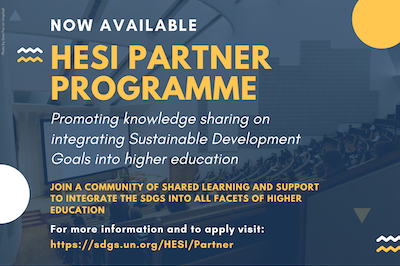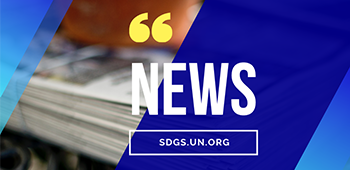Education
Description
Education for all has always been an integral part of the sustainable development agenda. The World Summit on Sustainable Development (WSSD) in 2002 adopted the Johannesburg Plan of Implementation (JPOI) which in its Section X, reaffirmed both the Millennium Development Goal 2 in achieving universal primary education by 2015 and the goal of the Dakar Framework for Action on Education for All to eliminate gender disparity in primary and secondary education by 2005 and at all levels of education by 2015. The JPOI addressed the need to integrate sustainable development into formal education at all levels, as well as through informal and non-formal education opportunities.
There is growing international recognition of Education for Sustainable Development (ESD) as an integral element of quality education and a key enabler for sustainable development. Both the Muscat Agreement adopted at the Global Education For All Meeting (GEM) in 2014 and the proposal for Sustainable Development Goals (SDGs) developed by the Open Working Group of the UN General Assembly on SDGs (OWG) include ESD in the proposed targets for the post- 2015 agenda. The proposed Sustainable Development Goal 4 reads "Ensure inclusive and equitable quality education and promote life-long learning opportunities for all" and includes a set of associated targets.
ESD is closely tied into the international discussions on sustainable development, which have grown in scale and importance since, Our Common Future appeared in 1987, providing the first widely-used definition of sustainable development as the "development that meets the needs of the present without compromising the ability of future generations to meet their own needs."
The crucial role of education in achieving sustainable development was also duly noted at the United Nations Conference on Environment and Development, held in Rio de Janeiro in 1992, through Chapter 36 of its outcome document - Agenda 21.
The importance of promoting education for sustainable development and integrating sustainable development actively into education was also emphasized in paragraph 233 of the Future We Want, the outcome of the United Nations Conference on Sustainable Development, Rio+20, in 2012.
In 2005, UNESCO launched the United Nations Decade of Education for Sustainable Development which reaffirmed the key role of education in shaping values that are supportive of sustainable development, and in consolidating sustainable societies. The final report of the UN Decade of Education for Sustainable Development, Shaping the Future We Want, was launched at the UNESCO World Conference on Education for Sustainable Development, held in November 2014, Nagoya, Japan.
In the run-up to the United Nations Conference on Sustainable Development, Rio+20, the Higher Education Sustainability Initiative (HESI) was created as a partnership of several sponsor UN entities (UNESCO, UN-DESA, UNEP, Global Compact, and UNU) aiming at galvanizing commitments from higher education institutions to teach and encourage research on sustainable development, greening campuses and support local sustainability efforts. With a membership of almost 300 universities worldwide, HESI accounts for more than one-third of all the voluntary commitments that came out of the Rio +20 Conference, providing higher education institutions with a unique interface between policy making and academia.

Higher Education Sustainability Initiative
The Higher Education Sustainability Initiative (HESI) provides higher education with an interface between higher education, science, and policy making by raising the profile of higher education’s sector in supporting sustainable development
Read more
HESI Partner Programme
Connecting higher education institutions, networks, and student organizations to create a community of shared learning in support of SDG integration
Read morePagination
| Title | Category | Date Sort ascending |
|---|---|---|
| Derek Ouyang, Stanford University | Presentations | 19-Jul-2017 |
| Ms. Raina Fox, Partnerships Director Millennium Campus Network (MCN) | Presentations | 19-Jul-2017 |
| Julie Newman, Director of Sustainability, Massachusetts Institute of Technology (MIT) | Presentations | 19-Jul-2017 |
| SDG SULITEST Assessment, Aurélien DECAMPS, Associate Professor, KEDGE… | Presentations | 19-Jul-2017 |
| Major Groups: Workers and Trade Unions, Women, Children and Youth and Indigenous People… | Co-chairs' meetings with Major Groups | 17-Jun-2014 |
| Joint Major Group Statement | Dialogue with Major Groups | 6-May-2014 |
| Egypt | Health and population dynamics; Education and life-long learning | 6-May-2014 |
| Ethiopia | Health and population dynamics; Education and life-long learning | 5-May-2014 |
| Caribbean Community (CARICOM) | Health and population dynamics; Education and life-long learning | 5-May-2014 |
| Group of 77 and China | Health and population dynamics; Education and life-long learning | 5-May-2014 |
| Bhutan, Thailand and Viet Nam | Health and population dynamics; Education and life-long learning | 5-May-2014 |
| Uruguay | Poverty eradication; Sustainable agriculture, food security, and nutrition | 5-May-2014 |
| Romania | Health and population dynamics; Education and life-long learning | 5-May-2014 |
| Jordan | Health and population dynamics; Education and life-long learning | 5-May-2014 |
| Pacific Small Island Developing States (PSIDS) | Health and population dynamics; Education and life-long learning | 5-May-2014 |
Pagination
Milestones
-
January 2015 SDG 4The 2030 Agenda for Sustainable Development commits to "provid[e] inclusive and equitable quality education at all levels – early childhood, primary, secondary, tertiary, technical and vocational training. All people, irrespective of sex, age, race, ethnicity, and persons with disabilities, migrants, indigenous peoples, children and youth, especially those in vulnerable situations, should have access to life-long learning opportunities that help them acquire the knowledge and skills needed to exploit opportunities and to participate fully in society. We will strive to provide children and youth with a nurturing environment for the full realization of their rights and capabilities, helping our countries to reap the demographic dividend including through safe schools and cohesive communities and families". SDG 4 aims to "Ensure inclusive and equitable quality education and promote lifelong learning opportunities for all".
-
January 2015 HESI Partner of GAPHESI became in 2015 an official partner of GAP for priority area 2: "Transforming learning and training environments". Through this partnership, HESI has aimed at supporting institutions in designing sustainability plans in partnership with the broader community, and assisting universities in incorporating sustainability into campus operations, governance, policy and administration.
-
January 2015 Incheon DeclarationThe Incehon Declaration was adopted on the occasion of the World Education Forum (WEF), held in May 2015 in Incheon, Republic of Korea. The Declaration aims at promoting education opportunities for all by 2030, within a framework to be finalized by November 2015 and has supported the core aspects of the Education 2030 Framework for Action, building on the UN-led Education For All (EfA) framework and goals.
-
January 2014 GAPAs a follow-up to the DESD, ended in 2014, the Global Action Programme has been designed as a concrete, tangible contribution to the post-2015 development and education agendas. Based on broad consultations and input from a wide range of stakeholders, the Programme came at a time when the international community was charged with proposing a new set of sustainable development goals that are action-oriented, global in nature and universally applicable.
-
January 2014 World Conf. on ESDThe 2014 UNESCO World Conference on Education for Sustainable Development (ESD) was held in Aichi- Nagoya, Japan from 10 to 12 November 2014. The Conference celebrated the results achieved during the UN Decade of ESD, identified lessons learnt while setting future action under the Global Action Programme.
-
January 2014 MuscatIn the “Muscat Agreement”, the final statement delivered at the Global Education For All Meetings, education was included as a target on the top of the global development agenda for the 2015 – 2030 period. Participants indeed pledged to galvanize international support for the overarching goal to “ensure equitable and inclusive quality education and lifelong learning for all by 2030”.
-
January 2012 HESICreated in the run-up to the Rio+20 Conference, the Higher Education Sustainability Initiative (HESI) is a partnership of UN entities (UNESCO, UN-DESA, UNEP, Global Compact, and UNU) counting today a membership of almost 300 universities from around the world. HESI also accounts for more than one-third of all the voluntary commitments that came out of Rio +20.
-
January 2012 Future We Want (Para 229-235)In the Future We Want, Member States reaffirm their commitment to the right to education, their engagement to strengthen international cooperation to achieve universal access to primary education, particularly for developing countries. They also reaffirm the importance to achieve full access to quality education at all levels as an essential condition for achieving sustainable development, poverty eradication, gender equality and women's empowerment, as well as human development. The Future We Want also stresses the need for ensuring equal access to education for persons with disabilities, indigenous peoples, local communities, ethnic minorities and people living in rural areas and for providing better quality and access to education beyond the primary level.
-
January 2005 UN Decade of ESDWith the adoption of Resolution 57/254 in 2002, the UN General Assembly declared a Decade of Education for Sustainable Development (DESD) to take place for the period 2005 – 2014. The inauguration of the DESD represented the beginning of 10 years of improvement and reorientation of education systems towards sustainable development, building on earlier commitments to ESD in Agenda 21. More specifically, the DESD’ s vision aims at the integration of principles and practices of sustainable development into all aspects of education and learning, encouraging changes in knowledge, values and attitudes for enabling a more sustainable and just society for all. The mandate of the DESD has energized a vast number of stakeholders – across Member States, UN agencies, the education sector, the private sector and civil society – to work in partnership to reorient education systems towards sustainable development.
-
January 2000 MDG 2Goal 2 aims at achieving universal primary education by 2015 and to ensure that. as target 2.A reads "children everywhere, boys and girls alike, will be able to complete a full course of primary schooling".
Pagination
- Page 1
- Next page




